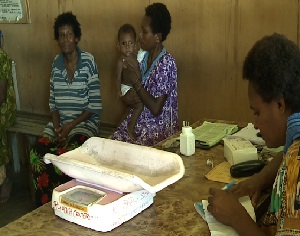By Serah Aupong – EM TV, Port Moresby
The National Department of Health is to trial the distribution of a vaccine to prevent cervical cancer.
Called the ‘human papilloma virus’ vaccine, it will be trialed first in NCD and Morobe this year. The nationwide program will be developed to vaccinate young girls in order to reduce the risks of developing cervical cancer later on in life. The program will target girls between the ages of 9 and 13 years.
Cervical cancer is one of the leading causes of death among women in PNG.
Dr Geita, maternal health expert at the National Department of Health says cancer of the cervix is the most common cases of cancer in women in PNG.
“It is over one thousand cervical cancer cases a year, closer to two thousand,” says Dr Glen Mola an Obstetrics & Gynecology expert.
Early detection of this cancer is still the best form of treatment, because an operation can then be done to help patients.
However, records show that, for various reasons, PNG women have sought treatment when they are already in the late stages of this cancer, and treatment at this stage means, radiotherapy and/or chemotherapy.
The only Cancer Unit specialised in this form of treatment in PNG is based at the Angau Memorial Hospital in Lae. It serves the entire population of Papua New Guinea.
Dr Mola says the radiotherapy unit in Lae is a good, “but it hasn’t been well utilised.”
While the department of health is working to build the capacity of the cancer unit, they are also working on another strategy to reduce the number of women from contracting cervical cancer.
In partnership with other stakeholders, the NDoH will be “trialing a vaccine, human papilloma vaccine, which will be given to school age children,” Dr Geita explains. The school age girls will be between the ages of 9 and 13.
Currently there are two brands of HPV vaccines, available on the international market. Gardesil and Cervarix. Research that Dr Mola has been involved in has shown that the two commercial HPV vaccines currently available on the market will be able to reduce the type of cervical cancer we have in PNG.
These vaccinations have been used in other countries with good results.
Dr Mola says that, for countries that have introduced this vaccine, “ol i painim olsem ol yangpla meri ol ino kisim HPV infection because ol i gat immunity pinis lo disla vaccine and the cancer of the cervix goes almost to zero.” (They have found that young girls did not contract the HPV infection because they already have immunity from the vaccine and the cancer of the cervix goes almost to zero.)
At the moment, the HPV vaccines are very expensivebecause of international patent laws but there is good news for this current vaccination progam because of the partnership the department of health has with its stakeholders, this vaccination will be free.
“Its free, while it is free, go for it,” Dr Geita says.
The department of health will be in touch with schools to discuss this program and Dr Geita encourage parents to allow their children to be vaccinated.
“Papamama, sapos yu ino laikim pikinini blo yu lo kisim cervical cancer bihain taim, plis bai mas yu tok orait lo em kisim disla vaccination.” (Parents, if you don’t want your child to contract cervical cancer in the future, please allow her to be vaccinated.)
The vaccination program is confirmed to start in the National Capital District and the Morobe province.
https://youtube.com/watch?v=FfhNfxqPLpA%3Ffeature%3Doembed%26wmode%3Dopaque%26showinfo%3D0%26showsearch%3D0%26rel%3D0


